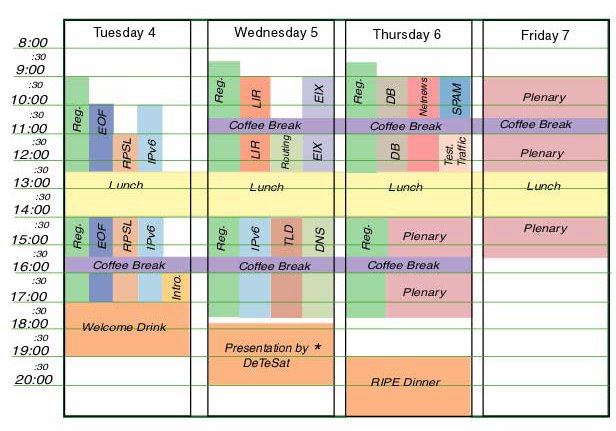Meeting Plan

Wednesday Evening - Presentation and Social Event
- Wednesday 5th May at 17.45
- DeTeSat Deutsche Telekom Gesellschaft fur Satellitenkommunikation would like to invite all participants of the RIPE 33 Meeting to the presentation "How can ISP-Infrastruture be extended and optimised by using satellite technology?".
- The speakers Friedemann Kuhnt and Jack van der Heijden are both IP specialists. The presentation will be held after the RIPE working group sessions on Wednesday, 5th May 1999, 17:45 h in the Maria-Theresie n-Saal in Palais Auersperg. Please take the opportunity to join them for their presentation followed by a small reception with drinks and snacks.
Newcomers introduction talk
- Tuesday 4 May at 16.00 - 17.00
- This newcomers introduction talk is meant for meeting participants who have not previously attended a RIPE meeting. Please indicate your interest in this session on the meeting application form.
RIPE 33 Opening Reception
- Tuesday, 4 May at 17:00
- All attendees that have registered at the venue meeting desk are welcome to attend the Opening Reception.
RIPE 33 Evening Dinner
- Thursday, 6 May 19:00
- A typical Viennese evening awaits at one of the city's small and intimate "Heuriger" or wine taverns. Guests travel aboard old-timer streetcars with music, wine and pretzels. The fun really starts when you arrive: enormous plates with local specialities and wine are served and music is performed by an original Viennese Schrammel orchestra. The evening literally flies by with food, drink, singing and - perhaps - even dancing.
The cost was EUR 55 per person.
- Tuesday, 4 May 11.00 until 17.00
- The RIPE NCC organised an in-depth tutorial on the new Routing Policy Specification Language (RPSL). The tutorial was free and open to all RIPE Meeting attendees.
RPSL Course
- The tutorial provided an introduction to RPSL, explaining how to register and query routing policy objects. RPSL is gradually being deployed in the Internet Routing Registry (IRR). It replaced ripe-181, the current IRR routing policy specification language. RPSL provides substantial extensions to ripe-181, making it possible to specify a much richer set of routing policies.
- Attendees were required to understand basic BGP operations, but need not be familiar with the IRR.
- Tuesday, 4 May 10.00 - 17.00
- IPv6, the next generation IP protocol, is designed to improve scalability, security, ease-of-configuration, and network management. The tutorial will give a brief overview of IPv6 protocol including address architecture, autoconfiguration and management (DNS, routing). We will also discuss the transition mechanisms which have been designed to ease the upgrade to IPv6.
- An overview of the configuration for routers and workstations with examples will be given: Cisco, FreeBSD, Sun, Windows NT, as well as the Merit MRTd.
- The tutorial will go over the different steps required to get connected on the 6BONE, including address configuration, routing and the 6BONE registry. The tunnel server is a service that provides a simple way to get connected to the 6BONE. The architecture of the server and examples will also be presented.
-
A description of the 6REN initiative, an IPv6 transit service, and the 6TAP project, a service for interconnecting early IPv6 networks, will be presented.
This tutorial is not focused on the theory behind the protocol but more on the practical considerations for using and deploying IPv6, so the intended audience is tcp/ip engineers, architects and network admins that want to understand IPv6 and to be able to deploy it.
The tutorial will be presented by Marc Blanchet and Florent Parent, both at Viaginie inc., a consulting firm working on network architectures, security and internationalization. Viaginie inc. is responsible with Dalhousie University for the deployment of IPv6 in Canada. Viaginie 6bone site has been on the 6bone for more than 2 years now, it is one of the backbone sites and maintains IPv6 links with many international organisations; it also runs the mirror of the 6bone whois server, the IPv6 mirror of the www.6bone.net and www.6ren.net sites.
Marc Blanchet wrote a internet-draft on a flexible method for IPv6 address assignments, soon to be published as an informational RFC and is the author of the concept of the 6tap exchange.